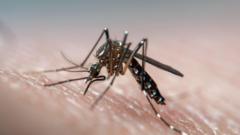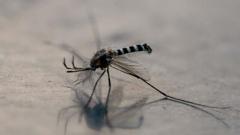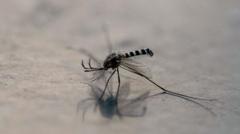In an innovative strategy to combat mosquito-borne diseases like dengue, yellow fever, and Zika, scientists have turned male mosquitoes deaf, significantly impairing their ability to mate. By targeting a specific genetic pathway associated with the mosquitoes’ hearing, researchers have found that the altered males are unable to effectively locate and mate with females, thus reducing the potential for breeding.
In the groundbreaking study conducted by scientists at the University of California, Irvine, the focus was on Aedes aegypti mosquitoes, notorious vectors responsible for infecting around 400 million people annually with various viruses. The researchers paid meticulous attention to the mating rituals of these insects, which typically involves males relying heavily on sound to pursue females during flight. With this new experimental technique, scientists disrupted the auditory functions of the males by mutating a protein vital for hearing, known as trpVa.
As a result of this genetic alteration, the modified male mosquitoes were unable to detect the alluring wingbeats produced by females, even after spending days together in a confined space. This stark contrast was evident when researchers compared the behavior of wild males, who actively mated and fertilized numerous females, to their deaf counterparts, who exhibited no mating success whatsoever.
The findings, published in the journal PNAS, indicate an "absolute" effect of this genetic manipulation, effectively eliminating mating among deaf males. Dr. Joerg Albert, an expert in mosquito reproduction, acknowledged the significance of these results but emphasized the need for further research to ensure the implications for ecological systems remain balanced. He pointed out that while mosquitoes are often viewed solely as disease carriers, they play critical roles in various ecosystems, serving as food sources and pollinators.
As researchers continue to explore methods to control mosquito populations, the idea of leveraging sound as a tool for reducing reproduction rates appears promising. In conjunction with existing strategies, such as releasing sterile males into disease-prone areas, this novel approach could pave the way for more effective management of mosquito-borne diseases while considering the delicate nature of food chains and biodiversity.















